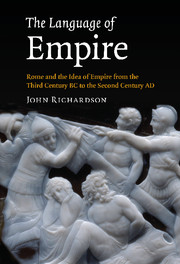 The Language of Empire
The Language of Empire Book contents
- Frontmatter
- Contents
- Preface
- List of abbreviations
- 1 Ideas of empire
- 2 The beginnings: Hannibal to Sulla
- 3 Cicero's empire: imperium populi Romani
- 4 The Augustan empire: imperium Romanum
- 5 After Augustus
- 6 Conclusion: imperial presuppositions and patterns of empire
- Appendix 1 Cicero analysis
- Appendix 2 Livy
- Appendix 3 Imperium and provincia in legal writers
- Bibliography
- Index
6 - Conclusion: imperial presuppositions and patterns of empire
Published online by Cambridge University Press: 01 October 2009
- Frontmatter
- Contents
- Preface
- List of abbreviations
- 1 Ideas of empire
- 2 The beginnings: Hannibal to Sulla
- 3 Cicero's empire: imperium populi Romani
- 4 The Augustan empire: imperium Romanum
- 5 After Augustus
- 6 Conclusion: imperial presuppositions and patterns of empire
- Appendix 1 Cicero analysis
- Appendix 2 Livy
- Appendix 3 Imperium and provincia in legal writers
- Bibliography
- Index
Summary
It looks as if both of us
Met in the uniqueness of history a premise
That keeps us apart yet parallel,
The gap reducible only by language.
Louis MacNeice, Memoranda to Horace (1962)This book has been an attempt to trace the historical development of the meanings and usage of two words, imperium and provincia, across the centuries in which Rome acquired and established power beyond the boundaries of Italy, becoming the mistress of a territorial empire which, in terms both of its geographical extent and of its longevity, was immense. Earlier in this book I likened this process to the construction of a biography, or more precisely of a pair of biographies of two closely related members of a family. In this concluding chapter the detailed review of the life history of these two words will be drawn upon to see the shape of their ‘biographies’ and the differing ways in which the two words interrelate across the period; and then to assess the contribution of this pattern to the understanding of the ways in which the Romans thought about their empire. The evidence from the ‘long second century’, from the Hannibalic war down to the death of the dictator Sulla, though it is sparser than for the periods that follow, shows that within the constitutional and political sphere the primary meaning of imperium at that time was the power of the city magistrates, extended by decision of the senate and (probably) the assent of the people to pro-magistrates when necessary. The word had (and continued to have throughout the period examined) a range of other meanings, notably and most commonly that of an order, given by a superior to an inferior; and, as might be expected, of the power to issue such orders.
- Type
- Chapter
- Information
- The Language of EmpireRome and the Idea of Empire from the Third Century BC to the Second Century AD, pp. 182 - 194Publisher: Cambridge University PressPrint publication year: 2008


